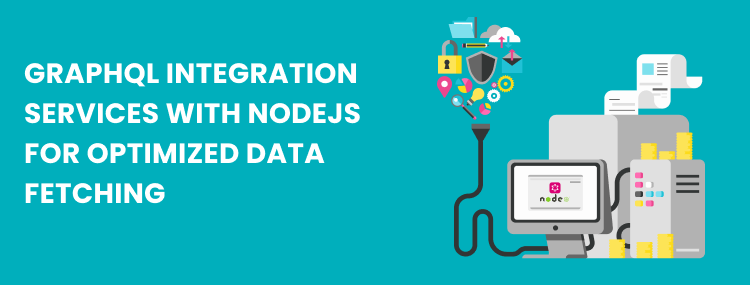In today’s fast-paced digital world, efficient data fetching is crucial for delivering a seamless user experience. Traditional RESTful APIs often result in over-fetching or under-fetching of data, leading to performance bottlenecks. However, by combining the power of GraphQL integration services with Node.js, developers can overcome these challenges and streamline data fetching processes.
GraphQL, an open-source query language for APIs, provides a flexible and efficient approach to fetching data. It allows clients to request specific data requirements, eliminating the need for multiple round trips to the server. When coupled with Node.js, a JavaScript runtime, developers can create highly optimized and scalable applications. Here’s how GraphQL integration services with Node.js can revolutionize your data fetching capabilities.
Enhanced Performance: By using GraphQL integration services with Node.js, you can improve the performance of your data fetching operations. GraphQL enables clients to retrieve only the required data, eliminating the issue of over-fetching. With Node.js, you can leverage its non-blocking I/O model and event-driven architecture, allowing concurrent requests and minimizing the waiting time for data retrieval.
Reduced Network Overhead: Traditional RESTful APIs often suffer from the problem of under-fetching, where multiple requests are needed to fetch related data. This results in increased network overhead and slower response times. However, with GraphQL’s powerful query capabilities, you can retrieve all the required data in a single request. Combining this with Node.js, which excels in handling concurrent connections, reduces the network overhead and enhances the overall efficiency of data fetching.
Declarative Data Fetching: GraphQL follows a declarative approach to data fetching, enabling clients to specify exactly what data they need and the shape of the response. This contrasts with the imperative nature of RESTful APIs, where clients have limited control over the returned data. With Node.js, developers can seamlessly integrate GraphQL schemas and resolvers, allowing for efficient and streamlined data retrieval based on client requirements.
Caching and Performance Optimization: GraphQL integration services with Node.js also enable you to implement advanced caching mechanisms to optimize data fetching. Node.js provides various caching strategies, such as in-memory caching or external solutions like Redis or Memcached. By caching frequently accessed data, you can significantly reduce response times and improve the overall performance of your application.
Scalability: Node.js, known for its ability to handle a large number of concurrent connections, pairs exceptionally well with GraphQL integration services. As your application grows and user demands increase, Node.js can scale horizontally across multiple servers, providing high availability and fault tolerance. With GraphQL’s efficient data fetching capabilities, you can handle complex queries without sacrificing performance.
In conclusion, integrating GraphQL with Node.js offers a powerful solution for optimized data fetching in modern applications. By leveraging the declarative nature of GraphQL, combined with the non-blocking I/O capabilities of Node.js, you can enhance performance, reduce network overhead, and improve scalability. Additionally, caching and performance optimization techniques further optimize data retrieval, ensuring a seamless user experience. Embrace GraphQL integration services with Node.js to unlock the true potential of your data fetching operations and deliver exceptional applications.



